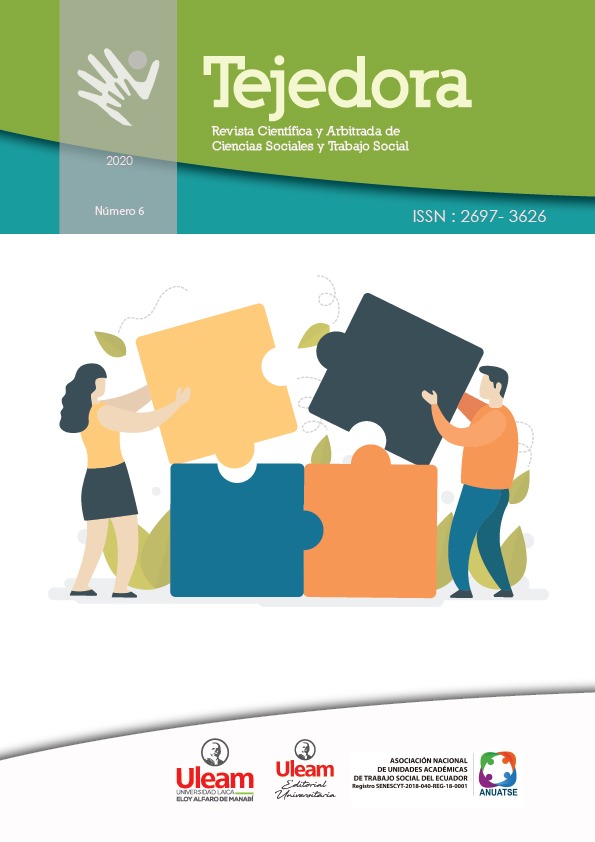VENEZUELAN MIGRATION AND APOROPHOBIA
DOI:
https://doi.org/10.56124/tj.v7i13ep.010Keywords:
Migration, discrimination, rejection, prejudice, stereotypes, marginalizationAbstract
This research addresses the theme of "Venezuelan migration and "Aporophobia". The main objective of the study is to analyze the incidence of aporophobia in the Venezuelan migrant population, specifically in a group of men and women belonging to the "Young People for the Future Foundation" in the city of Ambato. For this, a qualitative methodology was used with a non-probabilistic sample. Interviews were conducted with 16 migrants of Venezuelan nationality and 5 professionals specialized in the care of the migrant population. The results of the study revealed the different causes that motivate migration, such as economic difficulties, the political situation and the search for better living conditions. The study revealed a direct relationship between aporophobia or rejection toward migrants and the conditions and customs that apparently break with the culture of transit countries. This situation generates a vicious circle of exclusion, poverty and non-acceptance of migrants and in response to the situation of the migrant population, the implementation of a project for the labor insertion of Venezuelan migrants was proposed. It is necessary to promote awareness and respect for the migrant population, as well as to promote public policies that facilitate their social and labor integration.
KEY WORDS: Migration, discrimination, rejection, prejudice, stereotypes, marginalization
Downloads
References
OIM. (2006). Glosario sobre Migraciòn. Obtenido de Glosario sobre Migraciòn: https://publications.iom.int/system/files/pdf/iml_7_sp.pdf
OIM,71 organizaciones del Grupo de Trabajo para Refugiados y Migrantes requieren USD300 millones para la respuesta a personas en movilidad humana en Ecuador,2023.
Bustos Rubio, M. (2020). Aporofobia y delito: La discriminación socioeconómica como agravante (art. 22, 4ª cp.). JM Bosch.
Barragán, F. D. V., Cartagena, N. G. F., Arroyo, G. F. V., & Mina, J. R. L. (2022). Inobservancia a los derechos humanos: migración irregular de grupos vulnerables a Ecuador. Universidad y Sociedad, 14(S4), 108-117.
Herrera, G. (2021). Migraciones en pandemia: nuevas y viejas formas de desigualdad. Nueva sociedad, (293), 106-116.Obtenido de: http://publications.iom.int/system/files/wmr2015_sp.pdf
Lenín, E., Garcés, M., Fernanda, M., Garcés, E., Suárez, B. R., & Luis, J. (2018). Ministerio de Relaciones Exteriores y Movilidad Humana Quito-Ecuador Febrero 2018 La Política para la Igualdad de Género del Ministerio de Relaciones Exteriores y Movilidad Humana fue construida con el apoyo de la Oficina de ONU Mujeres en. Recuperado de: https://www.cancilleria.gob.ec/wp-content/uploads/2018/02/politica_para_la_igualdad_de_genero_2018.pdf
Serrano, D. C. C., Salazar, G. M. C., & Franco, A. C. (2019). Procesos recientes de movilidad humana entre Venezuela y Colombia: 2016-2018. In Crisis y migración de población venezolana: entre la desprotección y la seguridad jurídica en Latinoamérica (pp. 59-94). Universidad Nacional Autónoma de México (UNAM).
Polanía Reyes, C. L., Cardona Olaya, F. A., Castañeda Gamboa, G. I., Vargas, I. A., Calvache Salazar, O. A., & Abanto Vélez, W. I. (2020). Metodología de investigación Cuantitativa & Cualitativa.
Echarte-Fernández, M. Á., Martínez-Hernández, M., & Zambrano, O. (2018). Uma análise da crise econômica na Venezuela desde os postulados da Escola Austríaca de Economia. Revista Lasallista de investigación, 15(2), 68-82.
Joseph, H., & Ceja Cárdenas, I. (2021). Xenofobia, racismo y aporofobia. Ceja, Iréri; Álvarez Velasco, Soledad; Berg, Ulla D.(Coord.). Migración. Ciudad Autónoma de Buenos Aires: CLACSO, 2021. p. 59-65.
Naciones Unidas, CEPAL, 2022, https://www.cepal.org/es/comunicados/tasas-pobreza-america-latina-se-mantienen-2022-encima-niveles-prepandemia-alerta-la#:~:text=De%20esta%20forma%2C%20en%202021,porcentuales%20menos%20que%20en%202020
Published
How to Cite
Issue
Section
License
Copyright (c) 2024 Revista Científica y Arbitrada de Ciencias Sociales y Trabajo Social: Tejedora. ISSN: 2697-3626

This work is licensed under a Creative Commons Attribution-NonCommercial-ShareAlike 4.0 International License.






















